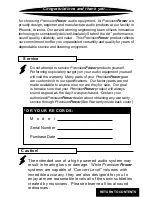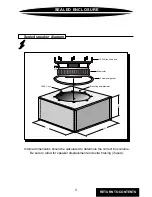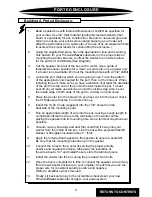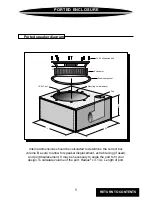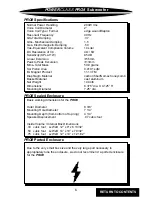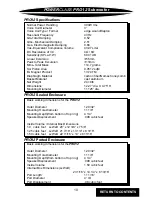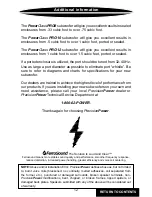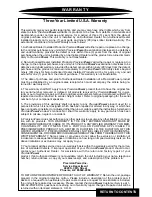
PORTED ENCLOSURE
4
Building A Ported Enclosure:
1.
Build a sealed box with internal dimensions of LxWxD as specified for
your woofer. Use 3/4” thick material (preferably medium density fiber
board or equivalent) for box construction. Be sure to use wood glue and
silicone to ensure your enclosure is sealed properly, as air leaks will
affect the performance of a subwoofer. (The use of an air stapler will help
to achieve the nicest results for constructing the enclosure.)
2.
Using the supplied template, trace the appropriate circle and mounting
hole pattern for your
PrecisionPower subwoofer on the proper side for
mounting the woofer. Be sure to offset the woofer to one side to allow
for the port to fit comfortably.(See Diagram)
3.
Cut the speaker hole out of the box with a router. Use a guide or
template whenever possible for a clean, accurate job; use a jig saw only
if a router is not available. Drill out the mounting holes with a 7/32” drillbit.
4.
Locate the port material which you are going to use. Trace the pattern
of the appropriate hole needed for the port, then cut the hole out. When
installing the port, make sure you have a distance of at least the diameter
of the port from the end of the port to the wall inside the box. To best
seal off any air leaks use silicone around the inside edge. Also, bevel
the inside edge of both ends of the port to cut down on port noise.
5.
Place the woofer into the hole which you have cut into the box to check
the fit. Make sure that the T-nut holes line up.
6.
Install the 10-24 T-nuts (supplied) into the 7/32” holes from the
backside of the mounting board.
7.
Run an appropriate length of wire into the box, leaving enough length to
comfortably install the wires to the terminals on the woofer before
placing the speaker into its mounting hole. Use a terminal cup whenever
possible.
8.
Vacuum out any shavings and dust that could find it's way into your
woofer from the inside of the box. Line the box with a polyester fiberfill
blanket or fiberglass insulation about 1” thick.
9.
Apply the included foam gasket to the speaker to ensure a sealed fit.
Be sure that the mounting holes line up on the gasket.
10.
Connect the wires to the woofer observing the proper polarity,
positive and negative terminals. Strip away the insulation of
the wire about a 1/4" and install the wires into the terminal posts.
11.
Install the woofer into the box using the provided 10-24 bolts.
12.
Once the box is completed it is time to connect the speaker wire coming
from the subwoofer enclosure to your amplifier. Check that you use the
proper wire for consistent polarity, positive and negative.
(Refer to amplifier owner’s manual.)
13.
Finally, sit back and enjoy to the incredible enhancement your new
PrecisionPower subwoofer brings to your audio system.
RETURN TO CONTENTS


